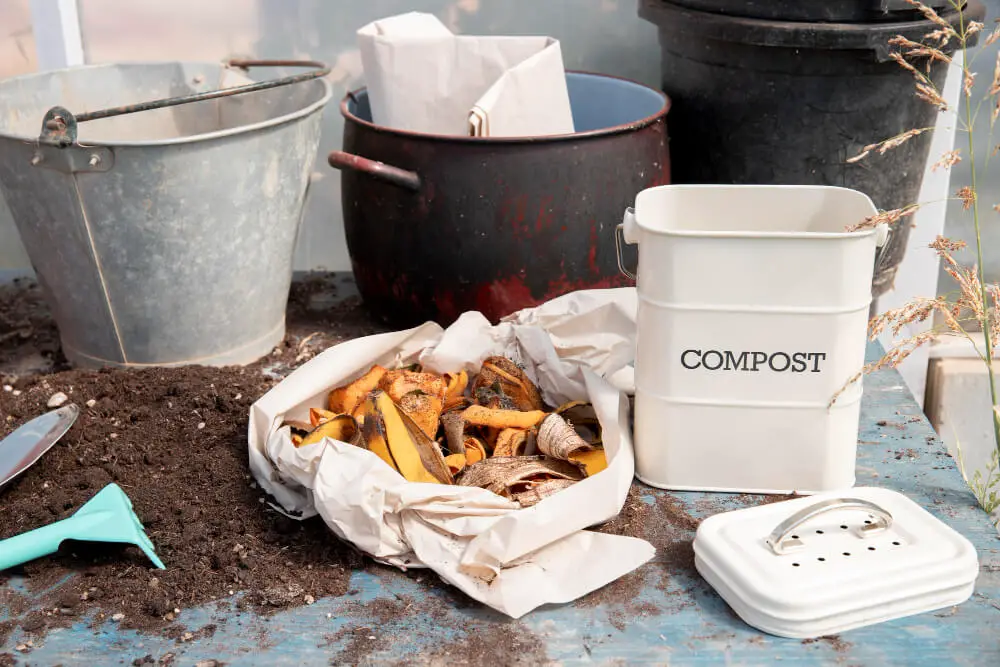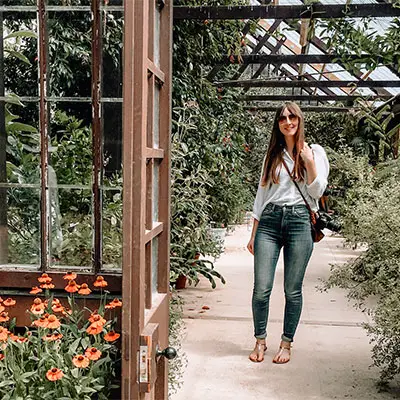How to Compost on a Balcony
June, 2022 |Making your own compost is a great way to become more self-sufficient. We’re often familiar with giant compost piles or large compost bins in bigger gardens. However, you don’t need heaps of space to do this. You can still create excellent compost on a balcony too.
Turning kitchen scraps into nutritious compost is a rewarding process. Using that compost to then grow your own balcony garden full of crops or blooming flowers is extra satisfying!
A couple of extra benefits to adding a balcony compost bin:
- You’ll save money by not having to buy a bag of compost for your vertical garden! Homemade compost is especially great for fruit trees growing in containers.
- It’s a sustainable way to recycle organic food waste and it keeps it out of landfills. Kitchen waste is an amazing compost ingredient. So instead of throwing it in the trash, put it to work in a balcony compost bin!
How to compost on a balcony: The different methods
Before you start buying compost bins and equipment, you need to choose the best composting method for your balcony. By choosing the wrong method you could end up waiting over 9 months for usable compost.
Below we’ve listed some of the quickest and most popular composting methods. Plus, we’ve added how long you should expect to wait, and which balcony it’s best for.
Hot Composting
Best for balconies that receive lots of sun. Length of time: 1-4 months
The main difference between hot and cold composting is the extra effort required. Hot composting takes a little more preparation and physical effort. However, overall, hot composting makes a higher quantity of compost in a shorter amount of time.
Your hot compost bin will need to be placed in the sunniest area of your balcony and mixed and turned regularly. Small compost bins will produce compost more slowly than larger bins. This is because they won’t be able to reach very high temperatures.
However, starting your hot compost bin in summer and placing the bin in direct sunlight will greatly speed up the process. For extra tips, check out our guide to hot composting on a balcony.
The decomposition process slows down in cold temperatures, so your compost bin may become dormant in winter.
Vermicomposting
Best for balconies with partial or full shade. Length of time: 1-2 months
If your balcony is shady for most of the day there are other composting methods that can speed up the process. Vermicomposting, also known as ‘worm composting’, involves using handfuls of hungry worms to digest old kitchen waste and turn it into incredibly nutritious soil.
Instead of heat and time, which are relied on in normal hot composting, the worms quickly work their way through organic kitchen waste. They leave behind ‘castings’ which is where all the nutrient magic lies.

Vermicomposting can really speed up the composting process. With vermicomposting, you could have nutrient-rich, earthy compost in as little as 1-2 months.
Before you head outside to dig up worms, you’ll actually need a special worm species and a special vermicompost bin too. Ready to invite these worms onto your balcony? We’ve created a guide on how to vermicompost on a balcony.
Tumbler composting
Best for balconies with partial or full shade. Length of time: 1-4 months, depending on several factors.
If you’re looking to speed things up, but can’t face a compost bin full of worms on your balcony, try tumbler composting! There are now specially created compost bins that can easily be tumbled and turned to increase aeration.
Depending on the time of year and bin size, some suppliers suggest you can create compost in a month. But you might find that it usually takes 2-3 months. Tumbler compost bins might be a more accessible option for you too as it takes the difficulty out of compost turning.
Things you shouldn’t put in a balcony compost bin
There are several items that you shouldn’t add to a compost bin, we’ve listed some of the items that should never be added to a balcony compost bin. Most garden and kitchen waste would be fine, but you should avoid these items to keep your balcony compost as healthy and nutrient-rich as possible:
- Meat, fish, butter, cooking oil, and dairy products (including bones). These products will biodegrade, but they will smell while doing so. They might also attract unwanted pests like rats and flies, so make sure your balcony compost bin follows a vegan diet!
- Any cooked/processed food, including cooked rice, baked goods, and bread. These foods will attract pests and flies and may add unwanted smells and bacteria as they break down.
- Citrus fruits and tomatoes. Both have high acidity which can kill the bacteria that are needed to break down the contents of your compost bin.
What to put in a balcony compost bin
To ensure your compost is packed full of nutrients you need to add a mix of ‘green’ and ‘brown’ ingredients. Here’s an example list of items that you can add to your balcony compost…
Green ingredients include plant cuttings, kitchen waste, dead flowers, grass clippings, tea leaves, and coffee grounds. These will all add nitrogen to the compost as they break down.
Brown ingredients include things like dry fall leaves, straw/hay, sawdust (from untreated wood), pine needles, coffee filters, egg cartons, and shredded newspaper. All of these will add carbon to your compost.

The other elements of great compost: Air and water
You may also need to add the occasional spray of water if your compost begins to look dry. The inside of the bin needs to be moist to create a perfect environment for worms or microbes to thrive.
The final element is air. An important stage of any compost creation is turning/mixing and aeration. Oxygen will help the microbial activity and turning the compost will help to break things down more quickly.
Balcony composting tips
Chosen the best composting method for you and your balcony? Use these expert composting tips and you’ll have a bin full of nutrient-rich organic compost in no time!
- If you’re not using worms, keep the compost bin on the sunniest part of your balcony to help everything break down quicker.
- If you are using worms, keep the bin in a shadier spot as full sun can raise the temperature too high for the worms.
- To keep flies at bay, add a layer of newspaper, soil, or untreated wood chips on top of any kitchen waste you add.
- If you have trouble with flies, you might need to avoid adding citrus fruit waste to your compost.
- Make sure to add an even mix of ‘green’ and ‘brown’ items for a good mix of nutrients.
Happy composting!






